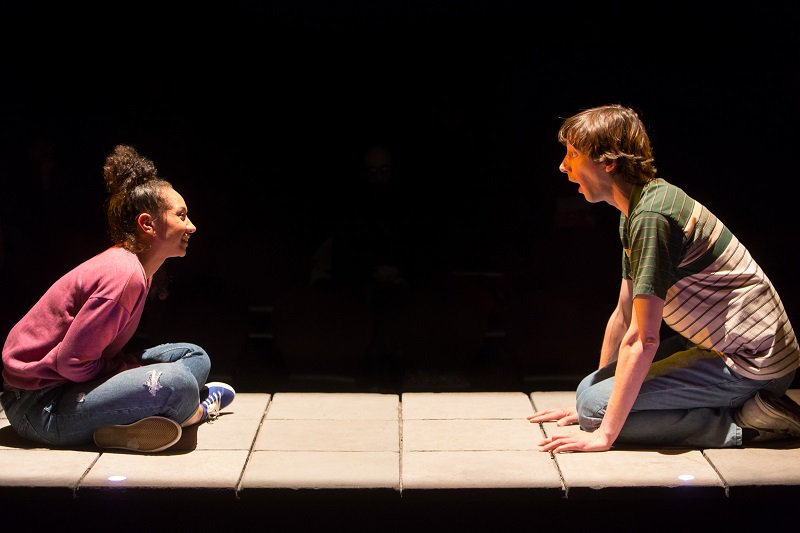Review | How My Light Is Spent at Royal Exchange Studio in Manchester
By Ross Semple

Kitty and Jimmy sit at opposite ends of a suspended stage that divides the audience in two. A knee-high catwalk of Newport paving hovers between them. Kitty is a worker on phone sex lines. Jimmy is a man who calls phone sex lines. Jimmy is also a man whose hands have become invisible.
How My Light is Spent opens with a wonderfully intriguing premise, two vibrant characters and a wealth of narrative possibilities. But these soon narrow to well-worn ground. Is the sexy phone sex worker really going to fall for the geeky punter who connects with her for nine minutes every Wednesday? She isn’t going to, surely. Is she? Oh…..
Alan Harris’ script trudges through one of the most clichéd stories about sex working, the supposedly transformative power of true love. You don’t need to be the most militant feminist in the world to question the sexual politics at the heart of the play: the idea that women, paid to offer sexual pleasure to men, will fall in love with these men if only they get to see how lovely, quirky and harmless the men really are.

When the leads do actually meet, Kitty resists advances from Jimmy, telling him not to voice his loves for her, as so many men do. There is a thin gloss of magical realism smeared over the story-telling, but ultimately the play surrenders to the very male fantasy that it appeared initially to criticise.
It’s not just the sexual politics of the piece that are outdated, the whole tone and detail feel anachronistic. There are mentions of smartphones and apps, but these hardly figure in the body of the story. Phone sex lines seem an unlikely source of a profitable business for Newport in the 21st century. Worse still, Jimmy’s symbolic growing invisibility is literally created by people not noticing him. This is the poetic schema of the blatantly obvious, and nothing in the ending offers any further dimension or metaphorical insight beyond nods to ‘love is light’ and ‘we’re all star beams.’ The script does, however, offer some good comedy moments, and those who enjoy seeing unlikely rom-coms play out without too much questioning will enjoy it.

Liz Stevenson’s direction wrings everything she can out of the play. The relationship between Jimmy and Kitty is played as convincingly as it can be, and there is real chemistry between the two talented leads. Stevenson’s crisp direction keeps the specifics of every scene and its contribution to the overall story sharply in focus. The moods of sex, courtship, dating and loving are all conjured effectively, and the movements between styles is expertly handled.
Rhodri Meilir is a suitably pathetic Jimmy. As anxiously self-piteous, weakly sexual and socially inept as the character is, Meilir manages to make him somehow likeable. His seamless transition to potential love rival Stevo is a great contrast. Alexandria Riley is strong and versatile, making Kitty’s choices understandable and adding real colour and depth to her performance of Rita, Jimmy’s mother.

This is a cleverly directed and well-acted production of a surprisingly regressive play with only limited, predictable pleasures to offer.
Rating: 3/5
How My Light Is Spent runs at Royal Exchange Studio, Manchester until May 13. For tickets, click here
For more great deals on tickets and shows visit tickets.attitude.co.uk.
Words by Stephen M Hornby
More stories:
Gay man sues funeral home for refusing to bury his late husband
Cher to be honoured with Billboard Icon Award
